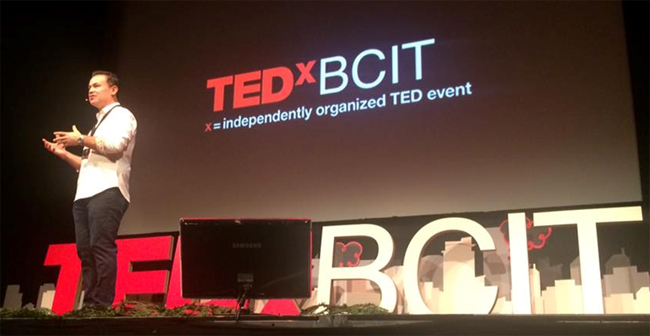Tewanee Joseph on TedxBCIT online

By Kathleen Imbert
Spreading great ideas has been Ted’s mission since 1984. A global group of inspired thinkers who passionately believe in the power of ideas to change attitudes, lives and ultimately the world, will be engaging in Vancouver all of March 12th. Tewanee Joseph, one of them, half Squamish Nation and half Maori, carrying his teachings on customs, traditions and protocol, gave a 15 minute talk at that TedxBCIT online world event.
Think again, Disconnect, Possibility, Adapt and Stewardship are this Ted lecture themes and the ingredients to Joseph’s leadership’s track record, especially during the Vancouver Winter Olympics when he was CEO of the hosting Four First Nations. His ground shaking re-branding on how to conduct relations with indigenous people in Canada in a world class event was innovative, inspiring and indigenous.
Savvy in making that emotional connection is his starting block. “It comes with responsibility when you accept that invitation and really creates an emotional connection that is not always there in today’s technology filled world. Whether it be during the Olympics, the Rugby World Cup, or the Canada games, I follow the same teachings every time. And if someone wants to connect with our peoples, we go straight to the people and talk with them. Whether it be government, schools, or companies, have face to face contact”, he says.
“My elders always said that we are stronger together but we need to remember our customs, traditions and protocols, and for me learning those protocols and applying them to the 21st century and seeing how that works. I stayed true to the teachings.” An invitation, he explains has double implications, “first following through on whatever we have to do, whether it be a naming ceremony, a wedding, or a memorial and explaining to the people who come that they are the records of time so their responsibility is to go back to where they come from, to keep it in their hearts and minds and tell that story time and time again and that’s what keeps our oral tradition alive.”
Joseph’s efforts are based on what he calls, education through action. “We can always learn from books or the internet but not as well and that is how our people are, we are doers.” He adds that “building the understanding and a common language” is part of improving the misunderstanding and lowering the barriers with non indigenous people. “We are not Canada’s aboriginal peoples, we are the Indigenous people in Canada since time memorial and when talking about issues like Reconciliation we have to be able to speak that common language, and it has to be done in person, sitting down with the people and creating that emotional connection”.
Joseph’s precepts are all but innovative, some may think, as they base themselves on his traditions and teachings. But he believes that cultures are not “owned but shared”. “I have learned so much from other cultures,” he says, “the Chinese, New Zealand, and that’s what creates innovative thinking. Inviting people into our lives, going to people, engaging with them.”
“Focusing on what we have in common and often we think we are so different, we’re not, we have values, we have protocols and we have traditions and once we figure out the parallels we have with cultures, then that conversation is easier to have.”
Orchestrating the First Nations’ relationships during the Vancouver Winter Olympics was innovative and something new. “Acknowledgement was not negative and people understood more and were more respectful. All the problems that First Nations have been saying for decades, like the poverty, murdered women, we are just at the beginning. The more people are interacting, putting it into action, the better Canada will be”, Joseph believes.
“We have a long way to go” he said and explained how his own children questioned him about the Residential schools and asked him “how can people treat other people like that? ” He sees our young people facing the trauma of what happened in Residential schools and it helps them learn and understand behaviors.
“First Nation’s leadership draws upon centuries of tradition and protocols,” says Joseph. His 15 minute Ted talk on the power of invitation and the willingness to accept invitations draws on his experience in changing relationships with Indigenous peoples. He applies it in his work and family and believes it spawns creativity and innovation.
http://tedxbcit.com/index.html#speakers

